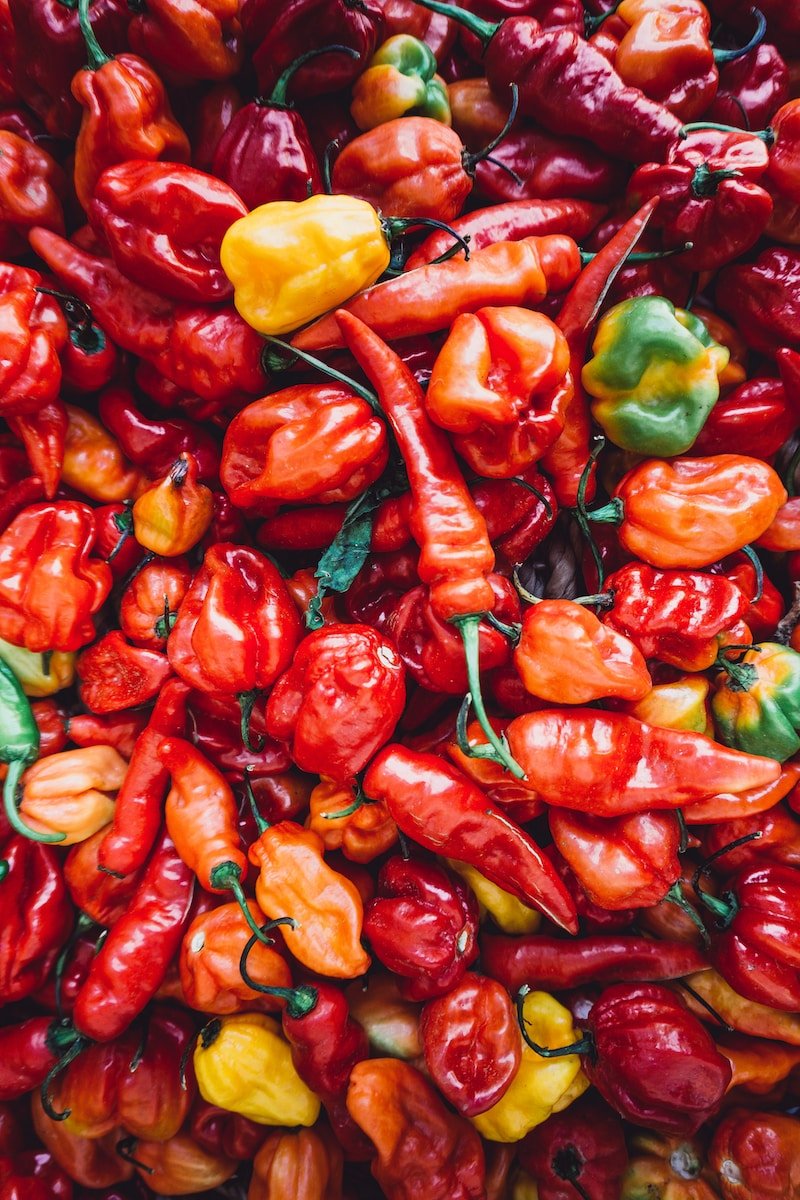Spicy foods have been a part of human cuisine for centuries. They add flavor and heat to dishes, and many people enjoy the sensation of eating them. But are spicy foods actually healthy? This is a question that has been debated for some time now, with arguments on both sides.
On one hand, some studies suggest that spicy foods can have health benefits. For example, capsaicin, the compound that gives chili peppers their heat, has been shown to have anti-inflammatory properties and may help reduce the risk of certain types of cancer. Additionally, some people find that eating spicy foods can help with digestion and may even aid in weight loss by increasing metabolism. However, on the other hand, some experts argue that consuming too much spice can have negative effects on health, such as causing heartburn or exacerbating stomach ulcers.
Overall, it’s clear that there are both potential benefits and risks to eating spicy foods. Whether they are healthy or not may depend on a variety of factors, including an individual’s overall diet and health status. In this article, we will explore the evidence behind these claims and provide a balanced view of the potential health effects of consuming spicy foods.
Understanding Spicy Foods
What Makes Food Spicy
Spiciness is a sensation that is caused by the presence of capsaicin, a chemical compound found in chili peppers. When capsaicin comes into contact with the tongue, it binds to receptors that are responsible for sensing heat, causing a burning sensation. The more capsaicin present in a food, the spicier it will taste.
Capsaicin has been found to have several health benefits, including pain relief, improved digestion, and increased metabolism. However, it is important to note that consuming too much spicy food can also have negative effects, such as heartburn and stomach irritation.
Different Types of Spicy Foods
Spicy foods can come in many different forms, from hot sauces to curries to peppers. Some of the most popular spicy foods include:
- Salsa: A Mexican sauce made from tomatoes, onions, and chili peppers.
- Sriracha: A spicy sauce made from chili peppers, vinegar, garlic, and sugar, often used in Asian cuisine.
- Curry: A spicy dish made with a blend of spices, including chili powder, cumin, and coriander, often used in Indian cuisine.
- Jalapeños: A type of chili pepper commonly used in Mexican cuisine, known for its medium level of spiciness.
It is important to note that not all spicy foods are created equal. Some may have more capsaicin than others, leading to a more intense burning sensation. It is also important to consider individual tolerance levels when consuming spicy foods, as some people may be more sensitive to the effects of capsaicin than others.
Health Benefits of Spicy Foods
Boosts Metabolism
Spicy foods can help boost metabolism and aid in weight loss. Capsaicin, the compound responsible for the heat in spicy foods, has been shown to increase thermogenesis, which is the process by which the body burns calories to produce heat. This increase in thermogenesis can help the body burn more calories and boost metabolism.
Aids Digestion
Spicy foods can also aid in digestion. Capsaicin has been shown to stimulate the production of digestive juices, which can help break down food more efficiently. Additionally, spicy foods can help alleviate symptoms of indigestion, such as bloating and gas.
Fights Inflammation
Spicy foods can also have anti-inflammatory properties. Capsaicin has been shown to inhibit the production of inflammatory molecules in the body, which can help reduce inflammation and pain. This can be particularly beneficial for individuals with conditions such as arthritis.
Overall, while spicy foods may not be a cure-all, they can provide some health benefits. Incorporating spicy foods into a well-balanced diet can be a delicious way to potentially boost metabolism, aid in digestion, and fight inflammation.
Potential Risks of Spicy Foods
Gastrointestinal Problems
Spicy foods can cause gastrointestinal problems in some people. These problems can range from mild discomfort to severe pain and can include bloating, gas, diarrhea, and stomach cramps. The capsaicin in spicy foods can irritate the lining of the stomach and intestines, leading to these symptoms.
Heartburn
Spicy foods can also cause heartburn in some people. Heartburn is a burning sensation in the chest that occurs when stomach acid flows back into the esophagus. The capsaicin in spicy foods can relax the lower esophageal sphincter, which allows stomach acid to flow back into the esophagus. This can cause a burning sensation in the chest and throat.
Food Allergies
Some people may be allergic to certain spices, such as cumin, coriander, or paprika. Food allergies may cause various symptoms such as hives, itching, swelling, and even breathing difficulties. In extreme instances, food allergies can result in anaphylaxis, which is a life-threatening allergic reaction.
To avoid potential risks, it is important to consume spicy foods in moderation and to pay attention to how your body reacts to them. If you experience any of these symptoms, it is best to avoid spicy foods or consult a healthcare professional.
How to Enjoy Spicy Foods Safely
Start Slowly
For those new to spicy foods, it’s important to start slowly. Begin with milder spices and gradually work your way up to hotter ones. This will give your body time to adjust to the heat and prevent any adverse reactions.
Pair with Other Foods
Pairing spicy foods with other foods can help to balance the heat and make it more enjoyable. For example, dairy products such as milk or yogurt can help to cool down the mouth and reduce the burning sensation. Starchy foods like rice or bread can also help to absorb some of the heat.
Stay Hydrated
Spicy foods can cause dehydration, so it’s important to drink plenty of water while eating them. This will help to prevent any uncomfortable side effects such as heartburn or stomach upset. Avoid drinking alcohol or caffeine as they can exacerbate the effects of spicy foods.
In summary, enjoying spicy foods can be a healthy and enjoyable part of a balanced diet. By starting slowly, pairing with other foods, and staying hydrated, anyone can safely enjoy the heat and flavor of spicy foods.
Conclusion
In conclusion, spicy foods can be a healthy addition to one’s diet, but it is important to consume them in moderation and with consideration of individual tolerance levels. The capsaicin found in spicy foods has been linked to potential health benefits such as improved digestion, increased metabolism, and reduced inflammation. However, excessive consumption of spicy foods can lead to gastrointestinal discomfort and may exacerbate certain health conditions.
It is important to note that not all spicy foods are created equal. Some spicy foods, such as those that are deep-fried or high in sodium, may not be as healthy as others. Additionally, individuals with certain medical conditions such as acid reflux or irritable bowel syndrome may need to avoid spicy foods altogether.
Overall, incorporating spicy foods into a balanced diet can provide a flavorful and potentially beneficial addition to one’s meals. However, it is important to listen to one’s body and consume spicy foods in moderation.




